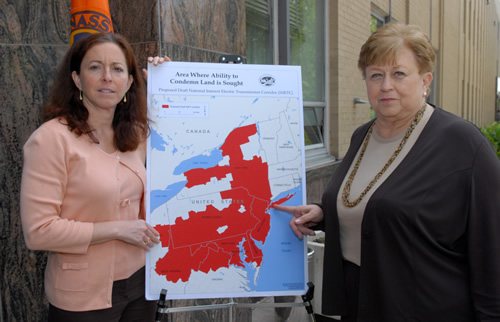Jacobs joins fellow lawmakers in criticism of the Department of Energy’s proposal to possibly seize land for power companies
Legislators call for hearings in both Nassau & Suffolk counties
Nassau County Presiding Officer Judy Jacobs (D-Woodbury), fellow majority legislators and environmental advocates recently joined together at a press conference today to call for bi-county public hearings to debate a Department of Energy (DOE) proposal which could threaten property owners across Long Island with Federal condemnation. The DOE’s proposal would designate areas from West Virginia to Upstate New York (including Long Island) as “national interest electric transmission corridors (NIET)” and give power companies special rights to build their lines across the region. The proposal would also permit the power companies to sidestep state authority if necessary in the interest of strengthening the nation's electrical grid.

Local lawmakers also expressed their displeasure with the DOE’s sparse schedule of hearings prior to the decision on the NIET corridors. There is only ONE meeting scheduled for the New York metropolitan area; one in Rochester, New York and only seven in the entire eight-state-region. The meeting in New York City is scheduled for May 27. However, legislators believe that public hearings should be held in both Nassau and Suffolk counties.
“It would appear that the 2.8 million citizens of Nassau and Suffolk are being disenfranchised by the Department,” Jacobs said. “The fact that the Department of Energy is proposing to designate all of Long Island as part of the corridor, while holding only one public meeting, demonstrates a lack of consideration and a rejection of hardworking Long Island residents.”
Jacobs added that she is calling on the DOE to hold public meetings in each of the counties affected by the Department’s proposal.
“It is fundamentally undemocratic for the Department to hold so few meetings,” she said. “They must do more in an effort to take public comment.”
Jacobs also signed a letter sent to the Secretary of the Department of Energy Samuel Bodman to express the legislature’s concern with the number of scheduled meetings.
According to the 2006 Census Estimate, there are 49,127,813 people in the Mid-Atlantic NIET Corridor, am area that covers 116,627 square miles.
"The stateagencies know our environmental, historical and sociallysignificant areas that need to be avoided when determining a site for energy infrastructure.Excluding states from site decisions is a disaster waiting to happen," said Adrienne Esposito, Executive Director of Citizens Campaign for the Environment."The federal government's new policies of bullying the states in order to provide benefits to energy industries flies in the face of democracy."

